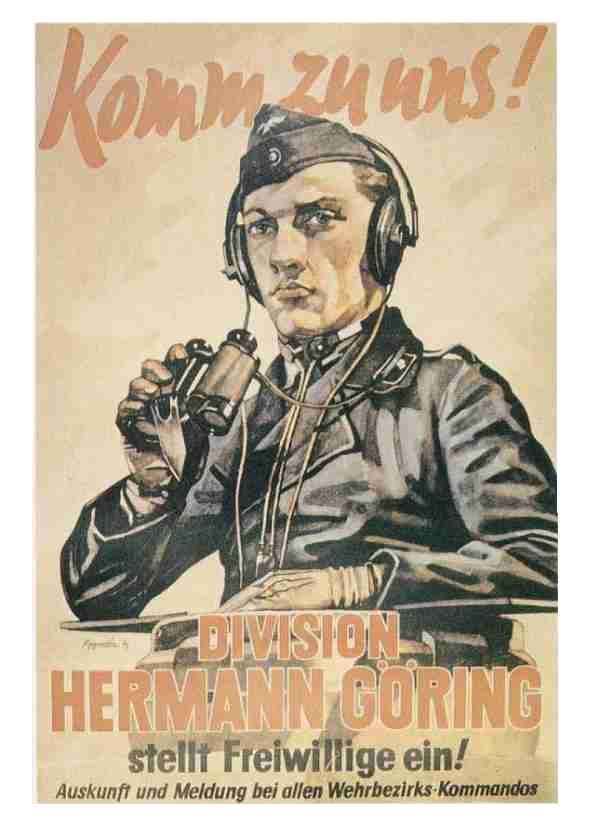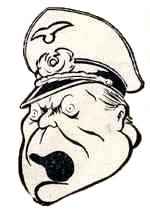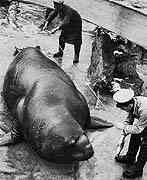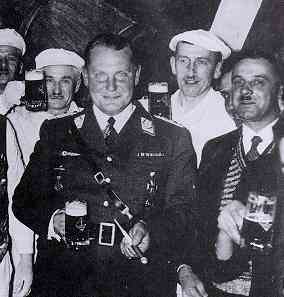Goering: Four-Year Plan

Goering: With regard to my gradual rise in economic leadership. The starting point was the agricultural crisis in the year of 1935. In the summer of 1936 the then Minister of War, von Blomberg, the Minister of Economy and President of the Reichsbank, Schacht, and Minister Kerrl came to me and asked me whether I was prepared to back a suggestion of theirs which they wanted to submit to the Fuehrer, namely, that I be appointed Commissioner for Raw Materials and Foreign Exchange. It was agreed that I should not function as an economics expert, which I was not; but some one was needed to take care of the difficulties due to shortage of foreign currency, which continuously arose because of our heavy demands, and at the same time to make available and accumulate raw materials--someone who was capable of taking measures which would perhaps not be understood by many people, but would have the weight of his authority.

Dr. Stahmer: What was the aim of the Four-Year Plan?
Goering: The Four-Year Plan had two aims: First, that German economy as far as possible and particularly in the agricultural sector, should be made secure against any crisis; secondly, in the event of war, Germany should be able to withstand a blockade to the greatest extent possible. Therefore it was necessary, first, to increase agriculture to the utmost, to control and direct it, to control consumption, and to store up supplies by means of negotiations with foreign countries; secondly, to ascertain which raw materials, imported until then, could be found, produced, and procured in Germany itself, and which raw materials that were difficult to import could be replaced by others more easily obtainable.
Briefly, as far as the agricultural sphere was concerned: utilization of every available space; regulation of cultivation according to the crops needed; control of animal breeding; building up of reserves for times of need or crop failures; as far as the industrial sector was concerned, the creation of industries supplying raw materials: First, coal--although there was sufficient coal, its production would have to be increased considerably, since coal is the basic raw material on which so many other things are dependent; iron-our mining industry had made itself so dependent on foreign countries that, in the event of a crisis, a most disastrous situation might arise here. I can quite understand that from the purely financial and business point of view that was all right but, nevertheless, we should have to mine and make available the German iron ores which were at our disposal, even though they were inferior to the Swedish ores; we should have to compel industry to make alloys and manage with German ores. I recklessly allowed industry a year's time.
As industry by then had still not begun to exploit these ores, I founded the Reich works which were given my name. They were primarily for opening up iron-ore reserves in German soil and using them in the mining industry. It was necessary to set up oil refineries, aluminum works and various other works, and then to promote the development of the so-called synthetic material industry in order to replace necessary raw materials which could be obtained only from abroad and under difficult circumstances. In the field of textiles this involved the conversion of the textile industry and of I. G. Farben.
That, roughly, was the task of the Four-Year Plan. Naturally a third question is of importance in this connection: the question of labor. Coordination was necessary here too. The most important industries had to have workers; less important industries had to dispense with them. The control of this allocation of labor, which before the war functioned only within Germany, was another task of the Four-Year Plan and the Department for the Allocation of Labor. The Four-Year Plan as such very quickly assumed too large proportions as an official organization. Then, after Schacht had left, I took over the Ministry of Economy for 2 months and fitted the Four-Year Plan into it. I retained only a very small staff of collaborators and carried out the tasks with the assistance of the ministries competent to deal with these things.

Goering: No, the aim of the plans was, as I said, to make Germany secure against economic crises, and to make her secure against a blockade in the event of war, and, of course, within the Four-Year Plan to provide the necessary conditions for rearmament. That was one of its important tasks.
1946 Nuremberg Tribunal: On day 84, Hermann Goering is cross-examined by Justice Jackson, the chief US prosecutor.
Mr. Justice Jackson: Now, the Four-Year Plan had as its purpose to put the entire economy in a state of readiness for war, had it not?
Goering: I have explained that it had two tasks to fulfill--1) to safeguard German economy against crises, that is to say, to make it immune from export fluctuations, and, as regards food, from harvest fluctuations, as far as possible; and 2) to make it capable of withstanding a blockade, that is to say, in the light of experiences in the first World War, to put it on such a basis that in a second World War a blockade would not have such disastrous consequences. That the Four-Year Plan in this respect was a basic prerequisite for the entire building-up and expansion of the armament industry goes without saying. Without it the rearmament industry could not have been shaped in this way.
Mr. Justice Jackson: To get a specific answer, if possible, did you not say in a letter to Schacht, dated the 18th day of December 1936, that you saw it to be your task, using these words, "within 4 years to put the entire economy in a state of readiness for war"? Did you say that or did you not?
Goering: Of course I said that.
Mr. Justice Jackson: Now, do you recall the report of Blomberg in 1937 in which--and you may examine if you wish Document Number C-175--in which he starts his report by saying: "The general political position justifies the supposition that Germany need not expect an attack from any side."
Goering: That may have been quite possible at that moment. I took a most reassuring view of the German situation in 1937. It was after the Olympic games and at that time the general situation was extraordinarily calm. But that had nothing to do with the fact that I felt obliged, quite apart from passing fluctuations from a calmer to a more tense atmosphere, to make German economy ready for war and proof against crises or blockades, for exactly I year later incidents of a different nature occurred.

Goering: That is the way Herr von Blomberg saw the situation. Concerning the readiness for war in Russia, Herr von Blomberg, in the same way as all those representatives of our Reichswehr mentality, was always really mistaken in contrast to the opinion expressed in other quarters with regard to Russian armaments. This is merely the opinion of Herr von Blomberg--not the Fuehrer's, not mine, and not the opinion of other leading people.
Mr. Justice Jackson: That, however, was the report of 'the Commander-in-Chief of the Armed Forces on the 24th of June 1937, was it not?
Goering: That is correct.
Mr. Justice Jackson: You organized, 1 month later, the Hermann Goering Works?
Goering: Right.
Mr. Justice Jackson: And the Hermann Goering Works were concerned with putting Germany in the condition of readiness for war, were they not?
Goering: No, that is not right. The Hermann Goering Works were at first concerned solely with the mining of German iron ore in the region of Salzgitter and in a district in the Oberpfalz, and, after the annexation, with the iron ore works in Austria. The Hermann Goering Works first established exclusively mining and refining plants for this ore and foundries. Only much later steel works and rolling mills were added, that is to say, an industry.
Mr. Justice Jackson: The Hermann Goering Works were a part of the Four-Year Plan, were they not?
Goering: That is right.
Mr. Justice Jackson: And you have already said that the Four-Year Plan had as its purpose to put the economy in a state of readiness for war; and the Hermann Goering Works were organized to exploit ore mining and iron smelting resources and to carry the process through to completed guns and tanks, were they not?
Goering: No, that is not correct; the Hermann Goering Works had at first no armament works of their own, but merely produced, as I again repeat, the basic product, steel, crude steel.

General Rudenko: I shall go on to the next question. Do you admit that as the Delegate for the Four-Year Plan you were in full charge of the working out of the plans for the economic exploitation of all the occupied territories, as well as the realization of these plans?
Goering: I have already admitted that I assumed responsibility for the economic policy in the occupied territories, and the directions which I had given for the exploitation of those territories.
General Rudenko: Can you tell me how many million tons of grain and other products were exported from the Soviet Union to Germany during the war?
Goering: I cannot give you the figures. How could I know that from memory? But I am sure it is by no means as large as it was stated here.
General Rudenko: On the basis of your own documents I have the figures, but we will pass on to that question later. I would like to return to the same conference which has already been mentioned. You remember the document submitted by the Soviet Prosecution, concerning the conference of the 6th of August 1942, Exhibit Number USSR-170, Document Number USSR-170? On 6 August 1942, there was a conference of commissioners of the occupied regions and of the representatives of the military command. This conference took place under your direction. You spoke at this conference--and I would like to remind you of some of the things you said.
Goering: May I have a look at these minutes?
General Rudenko: You want to see the minutes of the meeting? Certainly. It is quite a long document. I do not intend to read the whole thing, but only the relevant passages. I will ask you to look only at Page 111 of this stenographic record--the place is marked with pencil--especially the citations which I am going to quote here. On Page 111, it states: "Gentlemen: The Fuehrer has given me general powers on a scale such as he has never given hitherto under the Four-Year Plan. He has also empowered me..."
Goering: Just one moment. Are you not omitting "under the Four-Year Plan"?
General Rudenko: Evidently the translation has not reached you. I mentioned the Four-Year Plan. "He has given me additional powers under the Four-Year Plan reaching into every branch of our economic structure, whether within the State, the Party, or the Armed Forces." Is it correct you were given such exclusive rights and prerogatives as mentioned in the citation?

General Rudenko: In that case I have stated and interpreted correctly, what you stated at the conference.
Goering: Absolutely, in spite of its being wrongly translated into German.
General Rudenko: With regard to your special prerogatives and rights, I am going to cite the instructions which you gave, as well as the orders you issued to some of the members who took part in a conference held on the 16th of August, and which were binding upon them.
Goering: Yes.
General Rudenko: In that case, when you used such expressions as "squeeze out," "get everything possible out of the occupied territories," such sentences in the directives issued became orders for your subordinates, is that not correct?
Goering: Naturally, they were then put into their proper form. These were the words used in direct speech, and the language was not so polite.
General Rudenko: Yes, I understand.
Goering: You are referring to the passage--may I repeat it: "You certainly are not sent there to work for the welfare of the population..."
General Rudenko: Yes.
Goering: Do you mean that passage?
General Rudenko: Yes, Page 112. It states here, I shall read it: "You are sent there not to work for the welfare of the population, but for the purpose of extracting everything possible out of these territories. That is what I expect from you."
Goering: You have left out a sentence, "... so that the German nation may live ..."
General Rudenko: Yes, that is right.
Goering: One minute--"... extracting everything, so that the German nation may live. That is what I expect from you." Before that it states, however, and this is the sentence I would like to read: "In each of the occupied territories I see the people stuffed with food, while our own people starve." The sentence follows then.
General Rudenko: You do not deny that these are your own words: "You are sent there not to work for the welfare of the population, but to extract everything possible..."
Goering: You have to read that in connection with the preceding part. I do not deny that I said that.
General Rudenko: Do you deny your own words as stated here?
Goering: No, I am telling you that I did say that. What I do object to is the way you pick out certain things, whereas they should be taken with their context.
General Rudenko: These phrases in the document are very expressive. They require no comment. I draw your attention to the following extract on Page 113, which is also underlined. Here are some of your orders: "One thing I will do. I will get what I demand of you, and if you cannot do it, I will set up agencies which will get it from you, whether you like it or not." Do you see that extract? Is it correct that this is what you said at the conference?
Goering: That quotation has not been translated by the interpreter as it is written down here in the original. The interpreter who is translating your words into German is using many strong expressions which are not contained in this document. Squeeze out ...
General Rudenko: Please read your original.
Goering: It says here "to get from and obtain." Between "to get from and obtain," and "to squeeze out," there is a vast difference in German.
General Rudenko: To "get out" and to "squeeze out" is about the same thing. And what about the phrase, "I will set up agencies which will squeeze it out of you." What have you got?
Goering: "Get from" and not "squeeze out of."
General Rudenko: "Get from"? Did you have any cause not to trust the Reich commissioners? You refer to them as "special agencies."

General Rudenko: I ask you--these demands which you made to those present at the conference, did they not mean a ruthless plundering of the occupied territories?
Goering: No, the main question at this conference was more food.
General Rudenko: But I am talking about plunder. Plunder can mean plundering of food from the occupied territories?
Goering: I have just said I was responsible for the feeding of practically the whole territory. Some of it was territory which had to be provided with food, and some had a surplus, and it had to be equalized. At this meeting the contribution to be made by each Reich commissioner was for the most part fixed at 90 percent, and I in no way deny that in making my demands at the meeting I was worked up and used strong words. Later on the exact figures for the deliveries were laid down, and this was the net result of the meeting.
General Rudenko: I want to draw your attention to Page 118. Here it states as follows, I quote your words, Page 118, please; have you found the place?
Goering: Yes.
General Rudenko: Here, it says: "It seemed to me to be a relatively simple matter in former days. It used to be called plundering. It was up to the party in question to carry off what had been conquered. But today things have become more humane. In spite of that, I intend to plunder and to do it thoroughly." Have you found the sentence?
Goering: Yes, I have found it, and that was exactly what I said at that conference. I emphasize that again.
General Rudenko: I just wanted to ascertain that you really said that.
Goering: I did say that, and now I should like to give you the reason. In making that statement I meant that in former times war fed on war. Today you call it something different, but in practice it remains the same.
General Rudenko: All right. I draw your attention to Page 119. There, addressing those present at the meeting you state: "Whenever you come across anything that may be needed by the German people, you must be after it like a bloodhound. It must be taken out of store and brought to Germany." Have you found that place?
Goering: Yes, I have found it.
General Rudenko: Did you say that?
Goering: I certainly assume that I did say it; yes.
General Rudenko: You did say that. This sentence is the natural logical conclusion of your directions "to plunder and do it thoroughly."
Goering: No, it is not. Just after that I said that I had issued a decree authorizing the soldiers to buy up what they wanted, as much as they wanted, and as much as they could carry. Just buy up everything.
General Rudenko: You mention soldiers. I wanted to remind you of this too, and as you have quoted it, I will refer to that sentence again. You said, "Soldiers may purchase as much as they want, what they want, and what they can carry away."
Goering: As much as they can carry away, yes, and that was necessary because the custom authorities had issued a restrictive order whereby a soldier could take only a small parcel. It seemed wrong to me, that a soldier, who had fought should benefit the least from victory.
General Rudenko: So that you do not deny that the extract which has just been read is what you really said in your speech of 6 August 1942.
Goering: I do not deny that at all.
General Rudenko: Very well. Let us go to the next question. Do you admit that as Delegate for the Four-Year Plan you directed the deportation to forced labor of millions of citizens from the occupied territories, and that the Defendant Sauckel was your immediate subordinate in this activity? Do you admit that?
Goering: On paper he was my subordinate, but he was actually directly subordinate to the Fuehrer. I have already emphasized that to the extent that I was informed, I will take my part of the responsibility; and of course I knew about these statements.






The Nuremberg Tribunal Biographies
Caution: As always, these excerpts from trial testimony should not necessarily be mistaken for fact. It should be kept in mind that they are the sometimes-desperate statements of hard-pressed defendants seeking to avoid culpability and shift responsibility from charges that, should they be found guilty, can possibly be punishable by death.
Disclaimer:The Propagander!™ includes diverse and controversial materials--such as excerpts from the writings of racists and anti-Semites--so that its readers can learn the nature and extent of hate and anti-Semitic discourse. It is our sincere belief that only the informed citizen can prevail over the ignorance of Racialist "thought." Far from approving these writings, The Propagander!™ condemns racism in all of its forms and manifestations.
Source Note: The trial portion of this material, which is available in its entirety at the outstanding Avalon and Nizkor sites, is being presented here in a catagorized form for ease of study and is not meant to supplant or replace these highly recommended sources.
Fair Use Notice: This site may contain copyrighted material the use of which has not always been specifically authorized by the copyright owner. We are making such material available in our efforts to advance understanding of historical, political, human rights, economic, democracy, scientific, environmental, and social justice issues, etc. We believe this constitutes a "fair use" of any such copyrighted material as provided for in section 107 of the US Copyright Law. In accordance with Title 17 U.S.C. Section 107, the material on this site is distributed without profit to those who have expressed a prior interest in receiving the included information for research and educational purposes. If you wish to use copyrighted material from this site for purposes of your own that go beyond 'fair use', you must obtain permission from the copyright owner.

